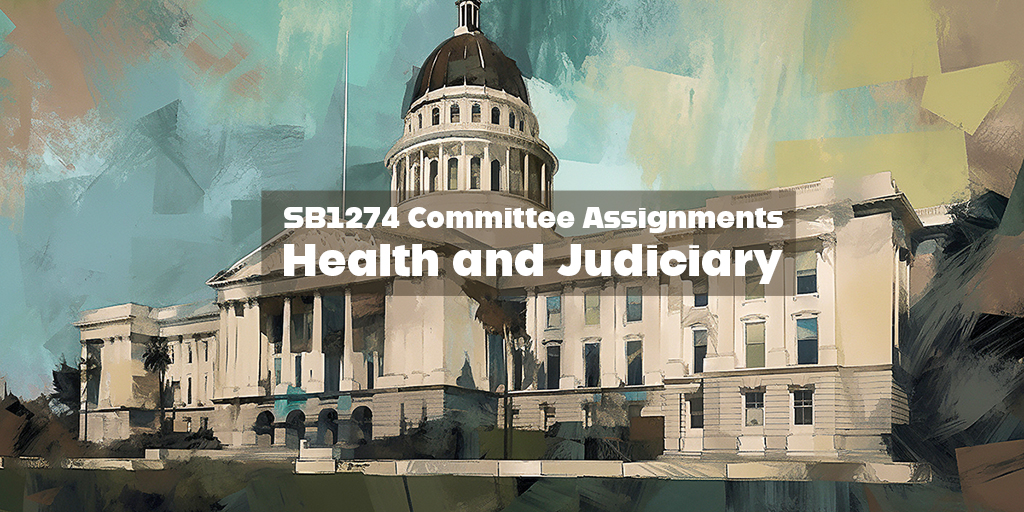Senate Bill 1274 has been assigned to its senate committees: Health and Judiciary. Here’s quick information and resources about both.
Senate Health Committee
While the bills sponsor, Senator Susan Talamantes Eggman, was the former chair of the Senate Health Committee, the committee is now chaired by Sen. Richard Roth (D-Riverside). The referral of the bill to this committee was expected. The committee considers bills “relating to public health, alcohol and drug abuse, mental health, public and private health insurance and managed care, food safety, health facility licensing, prescription drugs, emergency medical services, and related institutions.” Members of the committee in 2024 include 9 Democrats and 2 Republicans:
Steven M. Glazer (D-Contra Costa)
Lena A. Gonzalez (D-Long Beach)
Shannon Grove (R-Bakersfield)
Melissa Hurtado (D-Bakersfield)
Monique Limón (D-Santa Barbara)
Caroline Menjivar (D-San Fernando Valley)
Janet Nguyen (R-Huntington Beach), Vice-Chair
Richard Roth (D-Riverside), Chair
Susan Rubio (D-Baldwin Park)
Senator Lola Smallwood-Cuevas (D-Los Angeles)
Senator Scott D. Wiener (D-San Francisco)
The focus of SB1274 in the Health Committee will be on the bill’s direct connection to vital records, which is overseen by the California Department of Public Health. While arguments will no doubt come up about “privacy” and the California state constitution, those arguments are generally outside the scope of this committee. Instead, they are more likely to be considered in depth in the Judiciary Committee.
Senate Judiciary Committee
The Senate Judiciary Committee is chaired by Senator Thomas Umberg (D), The jurisdiction of this committee is in part the state’s family and probate codes, as well as bills relating to courts, judges, and privacy. Members of the committee include 9 Democrats and 2 Republicans:
Benjamin Allen (D-Santa Monica)
Angelique V. Ashby (D-Sacramento)
Anna M. Caballero (D-Merced)
María Elena Durazo (D-Los Angeles)
John Laird (D-Santa Cruz)
Dave Min (D-Irvine)
Roger W. Niello (R-Fair Oaks), Vice-Chair
Henry I. Stern (D-Los Angeles)
Thomas J. Umberg (D-Santa Ana), Chair
Aisha Wahab (D-Hayward)
Scott Wilk (R-Santa Clarita)
The focus of the committee for SB1274 will likely be on its relationship to the family code and to state courts, as well as expected arguments that the bill involves issues of birthparent privacy.
Hearings
Hearings for both committees are in person, though written testimony can be provided through various means, most often through the California Position Letter Portal but also by email directly to the committee. The Health committee generally meets on Wednesday afternoons.
The committees’ guidance for submitting testimony or participating in a specific committee hearing is here:
Resource: Position Letter Portal
We’ve created a video resource to help understand how to sign up and use the California Position Letter Portal. More about that is here (or click on the image below).




